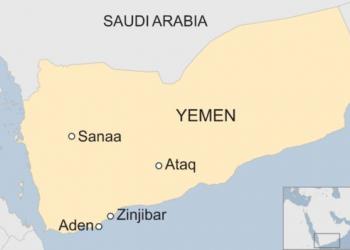UN resolution calls on Houthis to cease judicial persecution of Baha’is
Arabic translation
By a resolution of the Human Rights Council, on 26 September 2019 the international community has condemned the Houthi persecution of Baha’is on the basis of their religion or belief. This resolution passed just two weeks after the prosecutors in a Houthi-controlled appeals court in Sana’a, Yemen who defended a previous death sentence of a Baha’i on the basis of his beliefs, argued for the expulsion of all Baha’is from the country and the confiscation of their properties.
At the most recent appeals court hearing in Sana’a, on 17 September 2019, regarding the case of Mr. Hamed bin Haydara, the prosecutors requested that the court not only affirm the lower court’s decision to execute Mr. Haydara, but to “immediately deport” “all who are considered Baha’is” from the country and to “ban their entry” into the country. In its written statement, the prosecution further requested the court to adopt any additional measures to discourage Baha’i beliefs and their expression in the country.
The next court hearing for Mr. Haydara’s case is scheduled to take place on 1 October 2019.
“The Baha’i International Community is alarmed by the latest written statement of the prosecution, which further threatens not only the life of Mr. Haydara but also the thousands of individuals who regard themselves as Baha’is,” said Diane Ala’i, Representative of the Baha’i International Community to the United Nations.
This recent Human Rights Council resolution calls for the immediate release of all Baha’is detained in Yemen and for parties to the armed conflict to “cease their arbitrary arrest and detention and to cease the harassment and judicial persecution to which … [the Baha’is] are subjected”.
A second resolution, introduced by Iraq on behalf of the Arab Group and adopted by consensus at the Council, on Friday, 27 September, expressed “deep concern at the serious abuses and violations of international human rights law and international humanitarian law in Yemen committed by all parties to the conflict, including... persecution on the basis of religion or belief….”
Ms. Ala’i added, “The international community will, no doubt, be watching with keen interest to determine whether or not the judge presiding over Mr. Haydara’s case will take heed of this concern and demonstrate impartiality and fairness or become complicit in the actions of the Houthis that the international community has condemned as abuses and violations of international law.”
The two UN resolutions build upon a report by the UN Group of International and Regional Eminent Experts on Yemen, which catalogues a variety of war crimes committed in Yemen since 2014. In the report, the Group of Eminent Experts conclude that the Houthis “continued to persecute Baha’is on the basis of their belief, including by detaining and charging them with apostasy, openly deriding and demonizing the Baha’i Faith in legal filings, issuing death sentences and threatening their supporters.”
The incitement to hatred against the Baha’is, particularly by the Houthi leader, Abdel-Malek al-Houthi, was also a source of concern for the Group of Eminent Experts, which stated that “his words raise serious concerns in light of the present conflict where sectarian sentiments have been on the rise”. The report further indicates that the Houthis have denied the very existence of a Baha’i community in Yemen as a religious group.
At present, six Baha’is are detained in Sana’a, twenty five individuals including many of the administrators of the Baha’i community, are being prosecuted on the basis of their beliefs, and the safety of thousands of other Baha’is are under threat.
Iranian involvement
As early as May 2017, the UN Special Rapporteur on freedom of religion or belief, Dr. Ahmed Shaheed, commented and expressed concern that “[t]he recent escalation in the persistent pattern of persecution of the Baha’i community in Sana’a mirrors the persecution suffered by the Baha’is living in Iran.”
Over the last four years, Houthis have employed tactics similar to those utilized by the Iranian government against the Baha’is which include surveillance and monitoring of activities; arbitrarily detaining and interrogating individuals; raiding homes; confiscating property and funds; targeting leaders of the community; prosecuting Baha’is under false pretenses such as accusations that they are spies of foreign governments; seeking death sentences; and inciting hatred against the entirety of the community through inflammatory speeches by the highest authorities. Despite all this, the Houthis, similar to Iranian authorities, have brazenly denied the existence of any religious persecution in official correspondence with international institutions.
Such behaviors are consistent with recommendations contained in a secret memorandum that was approved by Iran’s Supreme Leader in 1991, which states that “A plan must be devised to confront and destroy their [the Baha’is’] cultural roots outside the country [Iran]”.
